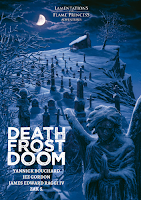Of course, while it's possible for bad GM's to run their OSR games this way, I don't think it's inherent in the systems or psychologies of OSR games themselves. For me, as a GM or a player, I like the feeling and flavor of terror. Not terror in the cheap, slapstick horror movie manner, but terror in the sense of life or death stakes. I want to feel unnerved and not fully in control of the story or the outcome of the adventure. If I feel that my player is always going to survive, I'm not going to be as invested because the stakes aren't very high.
I realize my take on this is not the majority opinion. It seems like a lot of players are simply looking for a stage to express themselves through the avatar of their player. That's a completely valid way to play; it's just not for me. However, because a lot of people don't want to feel that sense of terror that I like, the very idea of a game that threatens the lives of their characters automatically becomes something antagonistic.
I realize my take on this is not the majority opinion. It seems like a lot of players are simply looking for a stage to express themselves through the avatar of their player. That's a completely valid way to play; it's just not for me. However, because a lot of people don't want to feel that sense of terror that I like, the very idea of a game that threatens the lives of their characters automatically becomes something antagonistic.
Modern gaming's solve for this perceived anti-player bias has been a carefully designed system of balanced encounter challenge ratings, and quick character level-advancement with escalating power bloat. This gives only the very fool-hardiest of player a real chance to die by never pitting PCs against something stronger than themselves and giving them an arsenal of special abilities and video game-like combos to defeat the enemy. I could (and still may, someday) write an article on the OSR's combat-as-war versus the New School's combat-as-sport. Instead, what I wanted to focus on here is that first-step in character generation: the rolling of ability scores.
Ability scores are more than just stat blocks that help determine success or failure in encounters. Theyare the foundational pillars of what defines a character. In some ways there is no more effective spring board for character background than the ability scores. They also have a lot influence over a character's chance of survival at low levels before a character gains a lot of special abilities, spells, skills, feats, or magical items. With this in mind, how these scores are generated matter.
In Old School D&D (Basic Fantasy, in my case), ability scores are generated by rolling 3d6 straight-down the line: Strength, Intelligence, Wisdom, Dexterity, Constitution, and Charisma, giving scores ranging between 3-18. Simple right? Well, even in the rules of the old game, there are a host of secondary options all of which have an effect for how strong, smart, wise, agile, etc. your character is. Some of the popular options include rolling 4d6 and dropping the lowest die, rolling six columns of six stats and picking the best, or starting with a base of 8 in every stat and allotting a pool of points wherever desired. There are also methods and rules for freely arranging the scores, evenly swapping a certain number of scores, or dropping one score by two to bump another up by one. All of these methods are usually employed to boost the numbers of player's scores. They don't guarantee superpowered characters, but they greatly decrease the likelihood of truly low scores (but it's possible).
In my current Basic Fantasy campaign I'm running pretty close to RaW. I had my player roll 3d6 straight down and I allowed them to swap a pair of scores as long as one those scores was an intended prerequisite. If the player rolled below 9 in all of the first four (Str, Int, Wis, Dex) I had them re-roll because they wouldn't technically qualify for any class. Also, if the net of their modifiers was negative, they could also re-roll. I like Chris Gonnerman's fix for this, which is to subtract all the scores from 21 which turns the negatives to positives and still creates a balanced character.
I'm pretty happy with this method given my GM style, but something caught my eye when I was perusing my old copy of the original AD&D PHB. On page 9 it mentions that characters without at least two ability scores above 15 risk a low chance of survival. This gave me pause for a couple reasons. First, because I never remembered this from back in the day; and second, because this statement implied that it was recommended (in fact, Gary uses the word "essential") to use a method of generating ability scores that would produce at least two exceptional stats. The deadliness of Old School all of the sudden seemed not so deadly. I finally understood why my PCs were never as studly as the pre-gens in the old modules. A quick scan of the scores of magic items handed out in those adventures also makes those Old School slug-fests not as scary.
I guess what I've decided is for now I will stick with my 3d6 method and my rare magic item games while understanding that my players will need to be extra careful in combat and run often early on if they hope to live. This also means fewer monsters beaten which means fewer XP, which in turn means a longer time before they level up and gain more power. I've hit upon a good XP method that not only rewards for combat and treasure, but also for exploration, clever play, and role-playing. But that's for another post.





No comments:
Post a Comment